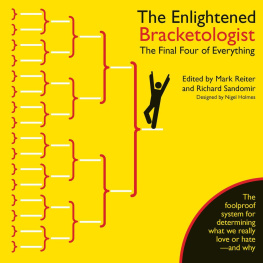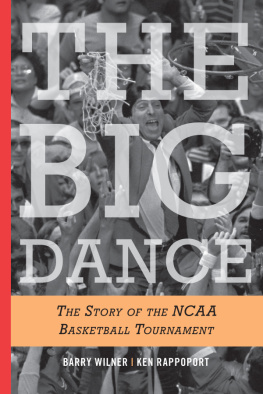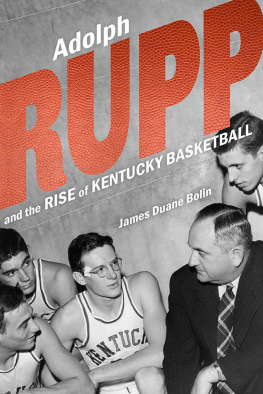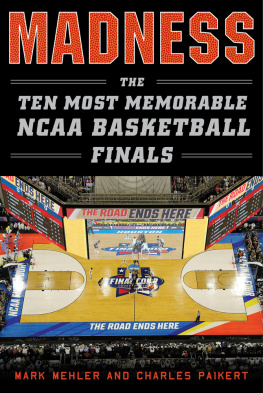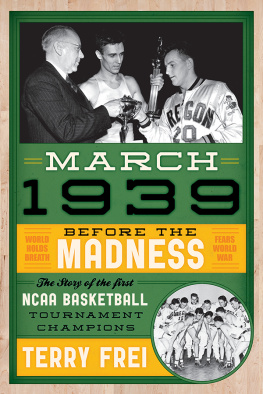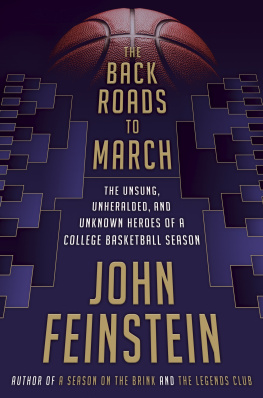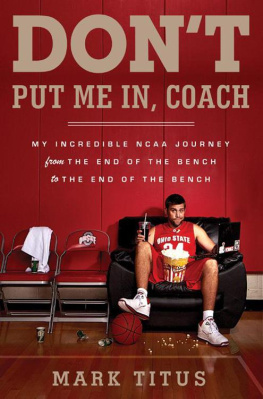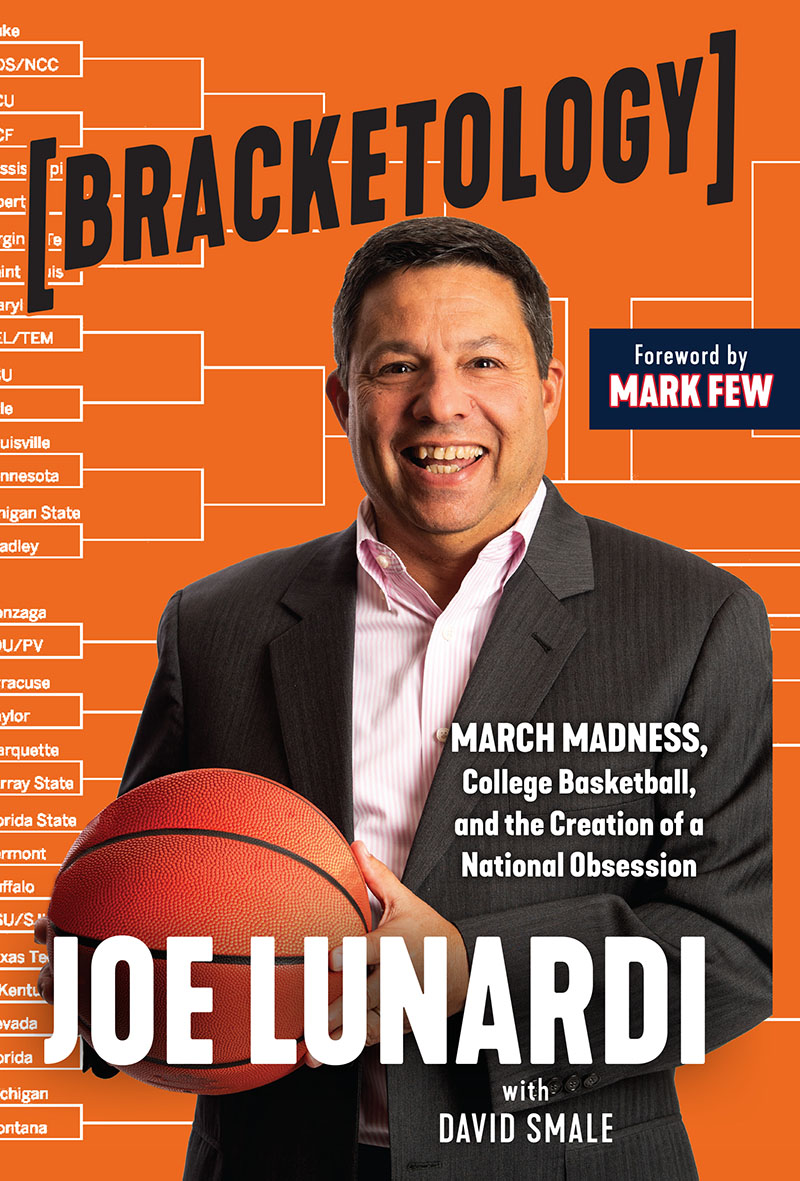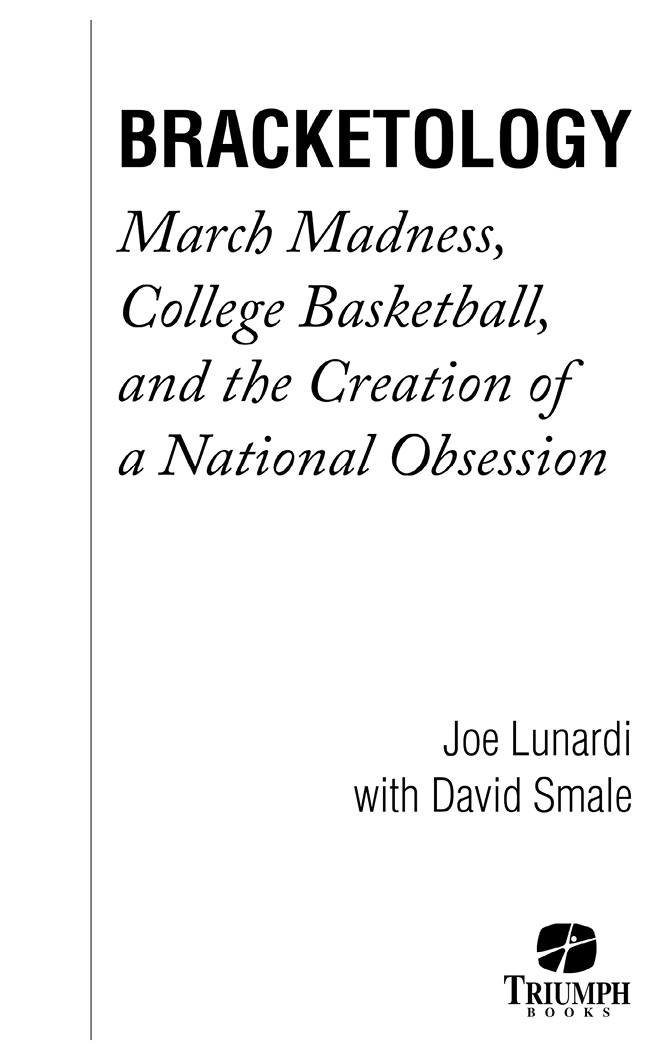
To Don DiJulia, the MVPMost Valuable Personof my alma mater and basketball career. Everyone who knows him, knows why.
Contents
Foreword by Mark Few
Ive spoken with Joe Lunardi on enough occasions to know that his breadth of knowledge of every detail of every team that should be considered going into the NCAA Tournament is beyond reproach. Hes relentless.
Coaches in general are relentless, whether it be in recruiting, scouting, preparation, or development. We throw all our energy and resources into trying to be successful, so I admire that trait in Joe. Its impressive and inspiring just how hard Joe works and how diligent he is. He does a new bracket for the following year immediately after the season is over. He constantly updates it in the spring and summer. Obviously, its purely speculative, but Im always impressed with just how accurate he is, whether thats seeding numbers or the teams that are chosen. He ends up nailing it.
Beyond correctly predicting who is going to get into that years tournament, Joes resources are very valuable to coaches because scheduling is such an important part of our job. Scheduling is tucked neatly behind recruiting in importance to being successful in your job as a coach. I think it would be amazing to research how many coaches look at his work and use it in regard to scheduling. He has become an extremely valuable resource.
I was an assistant at Gonzaga with Dan Monson. When he took over the head job in 1997, he changed how we scheduled at Gonzaga. We went out and aggressively tried to schedule the best opponents we could for our own experiences within the program. We felt like it would be fun for our players to play against the best teams. It also helped us grow the program.
We needed to analyze the best ways to schedule to put ourselves in the position to get strong consideration for an at-large bid. I dont think the Bracketology aspect really took hold for us until the early 2000slong after we reached the Elite Eight in 1999 and then backed it up with two Sweet 16s in the next two years. By then I felt like we had put ourselves in that position. We were already using those types of principles, but we had no numbers to back it up. We were doing it by feel, knowing college basketball and knowing who was going to be good.
Joe put a science to it. He knows details like: That team had a tough loss, but their point guard couldnt play that day, or This situation reminds me of the 2012 bracket. His recollection of all the incidences over the years is remarkable. Hes a true historian of the NCAA Tournament and the selection process. If you love college basketball like I do, youll love reading about how Bracketology came to be and how it has become such an integral part of our game.
Mark Few
Gonzaga University mens basketball head coach
Introduction by David Smale
Much like I had been for the past dozen or so years, I was assigned to write a couple of articles for the official program of the 2019 Final Four. One of the assignments was to write about the creation and development of Bracketology, the art of predicting the field for the NCAA Mens Basketball Championship. As a college hoops nerd, I thought it might be fun to learn about the history of this sports phenomenon.
I had no idea.
The NCAA and its communications partner, IMG College, suggested that I reach out to Joe Lunardi, the guy who created it. Id seen him on TV for the past several seasons, and he seemed like a nice enough guy. But you never know if his TV personality is anything like his real personality.
I found him to be funny in a self-deprecating way, articulate, confident, and humble at the same time. When we finished up our hour-long interviewabout four times longer than I usually spent with an interviewI told him that I appreciated his humor and his humility. He responded, Can you call my wife and tell her that?
For the next couple of weeks, I kept mulling over the idea of approaching Joe with the idea of writing a book about the subject. It scared me a little because if it took an hour for me to interview him for a 1,500-word story, how long would it take to do the interviews for a book? But mostly, I thought about the fact that he was a national personality and I was, well, just me.
I finally had the courage to approach him with another idea related, yet unrelated, to the Final Four story, and he seemed interested. When we talked again, I said, Have you ever considered writing a book about Bracketology?
He said, Yeah, Ive been approached quite a few times. I asked him who had written it with him, and he said, No one. Ive never done it. I dont think anyone would care enough about the story to buy a book.
Challenge accepted.
I spent the next few months trying to convince him that it could be a big seller. Joe told his wife that another guy had approached him about a book on his baby, and this time he was intrigued. Her reply was classic: Isnt that more like a pamphlet?
Joes agent, Maury Gostfrand, was in my corner, and we finally convinced Joe to try it. He and I spent the next few months working on the project, doing so almost exclusively remotely, and we finished it during the 2020 pandemic. With the help of Triumph Books, I think weve got a winner. My wife, Tammy, and Joes wife, Pam, will wait to see how many copies we sell, but as Joes dad used to tell him, Behind every successful man is a surprised woman.
Im thrilled with how this book turned out and Ive become very good friends with Joe through the process. And if you enjoy reading it half as much as I enjoyed helping him put it together, it will hold a valuable space on your bookcase for years to come.
David Smale
1. The Greatest Tournament of All
The UCLA dynasty under John Wooden is overrated. Its not the greatest accomplishment in college basketball history. There, I said it. Bracketology can make you crazy that way.
Of course, seven straight NCAA titlesand 10 in a 12-year spanis a remarkable streak. But it needs context. Having to win only four games for all but one of their championshipstwo victories coming in the weakest region of a much smaller tournament fieldmade what the Bruins achieved considerably easier than it would be today.
Until Woodens last title in 1975, which was a five-game journey, UCLA had a much easier road through the tournament than our current champions do. The Bruins never had to face teams from the ACC, the SEC, the Big Ten, or any of the storied independents, such as Notre Dame, until the very last game. Final Four matchups paired West versus Midwest until 1973. And there simply were fewer schools, particularly high-level basketball schools, west of the Mississippi.
Occasionally the Big Eight or the old Southwest Conference would have strong representatives, but the caliber and depth of play in those conferences wasnt as consistently good as that of the ACC or other leagues in the eastern time zone. In its run of championships between 1964 and 1975, UCLA often had a cakewalk to the Final Four. Its no coincidence that the only time the Bruins were bracketed against an ACC team prior to the title game, they lost to North Carolina State in the 1974 semifinals. The Bruins may have been on another planet in terms of talent, but often during their championship run, that talent was untested.
Obviously, those UCLA teams were great. If youre starting Lew Alcindor (later Kareem Abdul-Jabbar) or Bill Walton at center six times in an eight-year period, youre going to win a lot. But having to win six games in a deeper, balanced NCAA fieldwith the geographic wealth and dozens of quality at-large teams spread equallyis much harder than any path the Bruins faced during their glory years.


